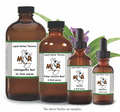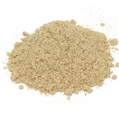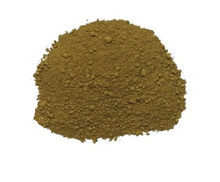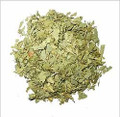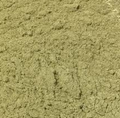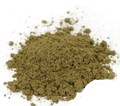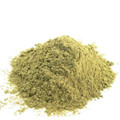 Loading... Please wait...
Loading... Please wait...- Home
- Bulk Herbs
- Herbs (D-F)
- Eucalyptus Leaf Powder
- Home
- Herbs - Organically Grown & Wild Crafted USA
- E-F
- Eucalyptus Leaf Powder
Product Description
Eucalyptus Leaf, Powder
Wild Crafted USA
Also Known As – Eucalyptus globulus, Blue Gum, Blue Mallee, Blue Mallee Oil, Eucalypti Folium, Eucalyptus blatter, Eucalyptus bicostata, Eucalyptus fructicetorum, Eucalyptus leaf, Eucalyptus odorata, Eucalyptus oil, Eucalyptus polybractea, Eucalyptus smithii, Fever Tree, Fieberbaumblatter, Gully Gum, Gully Gum Oil, Gum Tree, Red Gum, Stringy Bark Tree, Sugandhapatra, Tailapatra, Tasmanian Blue Gum.
Overview - Native to Australia, the eucalyptus group of trees and shrubs have spread to Africa, India and the Americas. One species of the tree is the tallest tree species in the world, surpassing the California Redwood and growing to a height of 480 feet. Related to myrtles, these trees have leaves with oil glands from which oil is distilled. Only a very few of the many tree species have the specialized oil that is used medicinally. Most trees of this species are evergreen, though some tropical species will drop their leaves.
Medicinal Uses - Eucalyptus oil is aromatic, antiseptic and stimulating. It is used as a disinfectant and has some anti-malarial qualities. It is a cardiac stimulant, so should be used with care. Internally, eucalyptus is toxic when taken internally, although in the past some have done so in very small amounts. It is best to only use the oil externally or in a vaporizer as an inhalant for congestion. Commercial cough drops that contain eucalyptus are generally safe unless allergic reaction has been shown to the herb. It is also added to some mouth washes. Externally, eucalyptus can be applied to skin in an ointment or in a spray for various skin ailments and tick repellent.
Other Uses – Other species of eucalyptus are used for various purposes. The oils are separated into medicinal oils, industrial oils and aromatic oils. They are used in soap making, perfume making and flotation purposes.
Herbs to Combine/Supplement - Do not combine with coltsfoot, borage, comfrey or houndstooth, as eucalyptus can worsen the side effects of these herbs.
Parts Used - Leaves
Precautions - Essential oil should be diluted in a carrier oil to prevent skin reactions with the pure oil. Taking eucalyptus internally can result in allergic reactions, toxicity and even death. Symptoms of poisoning can include nervous system and brain activity slowing down, seizures, coma, drowsiness, abdominal pain, diarrhea, nausea, vomiting, dizziness, constricted pupils, fever, difficulty walking, slurred speech, headache, convulsions, delirium, wheezing, difficulty breathing, coughing, and blue discoloration of the skin. People who have shown reactions to this herb should avoid it at all costs.
- It may also interact with prescription medications. This herb should be avoided by children and pregnant or breastfeeding women.
Preparation and Dosage - A drop or two of eucalyptus tincture or essential oil can be placed in a vaporizer to help with congestion. It can also be found in commercial cough drops and mouth wash. Use these products only according to directions on the package.
Disclaimer - These products are not intended to diagnose, treat cure or prevent any disease. Reviews are not intended as a substitute for appropriate medical care or the advice of a physician or another medical professional. Actual results may vary among users. Mountain Maus Remedies LLC makes no warranty or representation, expressed or implied, as to the accuracy or validity of the information contributed by outside product review submissions, and assumes no responsibility or liability regarding the use of such information. The information and statements regarding the dietary supplements have not been evaluated by the Food and Drug Administration. If you have a medical condition or disease, please talk to your health care provider. If you are currently taking a prescription medication, you should work with your health care provider before discontinuing any drug or altering any drug regimen, including augmenting your regimen with any herb or dietary supplements. Do not attempt to self-diagnose any disease or ailment based on the reviews and do not use the information contained herein for diagnosing or treating a health problem or disease. Proper medical care is critical to good health. If you have a health concern or suspect you have an undiagnosed sign or symptom, please consult a physician or health care practitioner.







